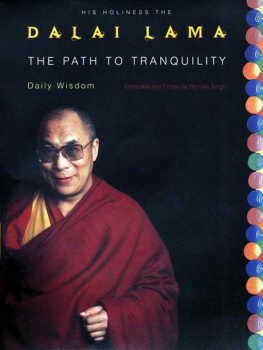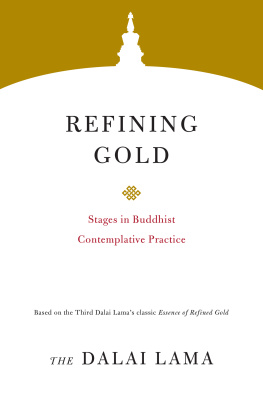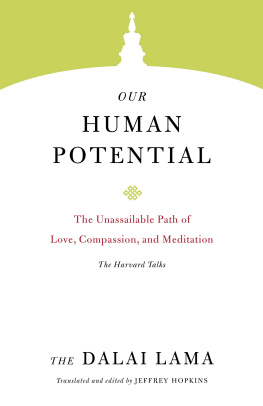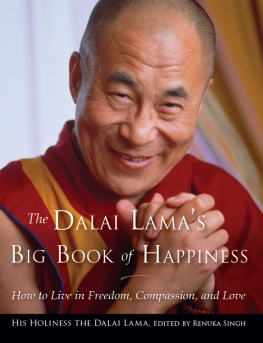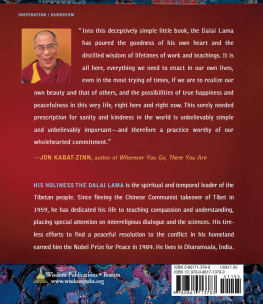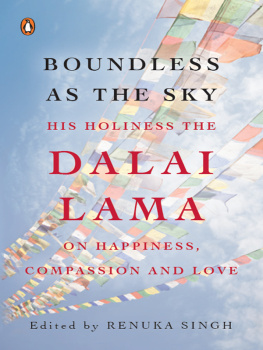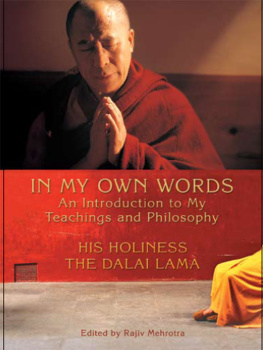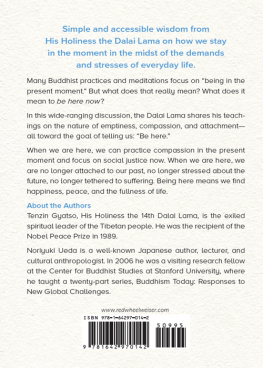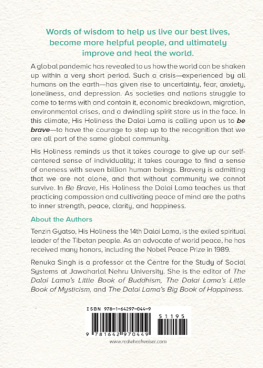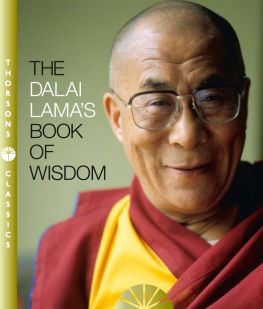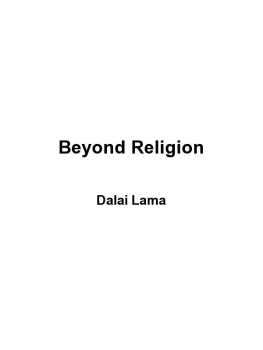Acknowledgments
Grateful acknowledgment is made for permission to reprint the following copyright material:
From Gentle Bridges by Jeremy W. Hayward and Francisco J. Varela. Copyright 1992 by Francisco J. Varela and Jeremy W. Hayward. Reprinted by arrangement with Shambhala Publications Inc., Boston.
From A Flash of Lightning in the Dark of Night by the Dalai Lama. 1994 by Association Bouddhiste des Centres de Dordogne. Reprinted by arrangement with Shambhala Publications Inc., Boston.
From Violence and Compassion: Conversations with the Dalai Lama, translated by Jean Claude Carriere. Translation copyright 1996, Doubleday a division of Bantam Doubleday Dell Publishing Group. Used by permission of Doubleday, a division of Bantam Doubleday Dell Publishing Group, Inc.
From Mandala magazine. Reprinted by arrangement with Foundation for the Preservation of the Mahayana Tradition (FPMT) International Office, California, publisher of Mandala magazine.
From Kindness, Clarity and Insight, edited by Jeffrey Hopkins and Elizabeth Napper, Copyright 1984 by Tenzin Gyatso and Jeffrey Hopkins; Path of the Bodhisattva Warrior, compiled and translated by Glenn H. Mullin, Copyright 1988 by Glenn H. Mullin; Path to Bliss, edited by Christine Cox, 1991; The Dalai Lama: A Policy of Kindness, compiled and edited by Sidney Piburn, (second edition), 1993; and Healing Anger by The Dalai Lama, 1997. Reprinted by arrangement with Snow Lion Publications, New York.
From Generous Wisdom, edited by Dexter Roberts, 1992; Dialogues on Universal Responsibility and Education by H.H. the Dalai Lama, 1995; Opening the Mind and Generating a Good Heart by H.H. the Dalai Lama, 1995 (4th edition). Reprinted by arrangement with the Library of Tibetan Works and Archives, Dharamsala.
From Collected Statements, Interviews and Articles: H.H. the XIV Dalai Lama, 1986. Reprinted by arrangement with the Department of Information and International Relations, Dharamsala.
From Mind Science by the Dalai Lama, 1991; The Dalai Lama: The Meaning of Life, edited by Jeffrey Hopkins, 1992; The World of Tibetan Buddhism by the Dalai Lama, edited by Geshe Thupten Jinpa, 1995; The Good Heart by H.H. the Dalai Lama, edited by Robert Kiely, 1996; S leeping, Dreaming and Dying, edited by Francisco J. Varela, 1997. Reprinted by arrangement with Wisdom Publications, New York.
From Freedom in Exile: The Autobiography of His Holiness, The Dalai Lama of Tibet . Copyright 1990 by Tenzin Gyatso. Reprinted by permission of HarperCollins Publishers, Inc.
From Worlds in Harmony by the Dalai Lama with Daniel Goleman et al, 1992. Published by Parallax Press, California.
From Dharma Celebration Lectures. Reprinted by arrangement with Tushita Mahayana Meditation Centre, Delhi.
Foreword
As human beings, we all want to be happy and to avoid suffering. In my limited experience, if we are to achieve this, it is immensely valuable to be able to cultivate and maintain a positive state of mind. In the Buddhist tradition to which I belong, one of the most effective means of doing so is to engage in meditation. Although meditation can sometimes mean sitting in a particular formal posture and stilling the mind, it can also include continuously familiarizing ourselves with positive thoughts. This is why we regularly read and recite the texts of scriptures and prayers. I have drawn great inspiration over the years from a short work called Eight Verses for Training the Mind. It contains much useful advice, counseling us always to consider others as more important than ourselves, to face and oppose the disturbing emotions that endanger our peace of mind, and to give whatever benefit arises to others while shouldering whatever difficulties occur on ourselves.
This book contains daily quotations selected from my own writings and published works. I humbly pray that readers may find some inspiration in these words to develop that warmhearted peace of mind that is the key to enduring happiness.
His Holiness the Dalai Lama
February 26, 1998
Editors Note
This book is a compilation of daily thoughts by His Holiness the Dalai Lama. It also forms a part of His Holinesss contribution to the preservation of the ancient Indian wisdom-culture. My publisher originally proposed the idea behind this book and His Holiness gave his approval and blessing. I began working on it without delay at the beginning of last year.
I am acutely aware of the principle of selectivity unfolding here. The quotations are my selections from His Holinesss writings, teachings, and occasional interviews. These, I hope, will properly reflect His Holinesss spiritual and secular concerns and spread his message of universal responsibility, compassion, and peace. Also, through these quotations, I intend to share with nonspecialized audiences and Dharma students the different vistas and possibilities that opened before me, and the apparently simple yet complex core of His Holinesss essential thoughts. However, one must bear in mind that terms such as listening, giving, thinking, meditating, etc., are processual and should be perceived in the context of the Buddhist practice of cultivating bodhicitta the aspiration to attain enlightenment for the benefit of all.
In the foreword, His Holiness very aptly refers to the Eight Verses for Training the Mind. Based on my personal experiences, I can also vouch for their unfailing usefulness and would like to present the verses here:
Regarding all sentient beings
As excelling even the wish-granting gem
For accomplishing the highest aim,
May I always hold them most dear.
When in the company of others
I shall always consider myself the lowest of all,
And from the depth of my heart
Hold them dear and supreme.
Vigilant, the moment a delusion appears,
Which endangers myself and others,
I shall confront and avert it

